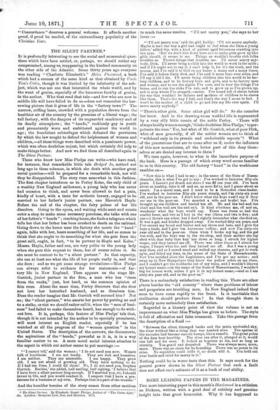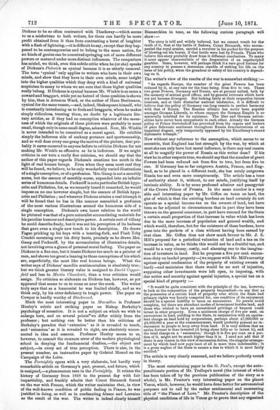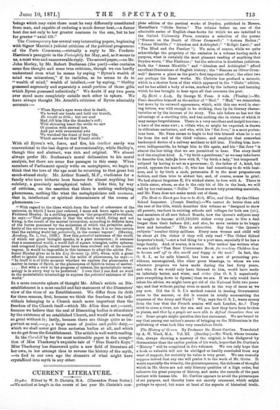SOME LEADING PAPERS IN THE MAGAZINES. THE most interesting paper
in this month's Blackwood is a criticism on Dickens, written with a good deal of subtlety and genuine insight into that great humourist. Why it has happened to Dickens to be so often contrasted with Thackeray—which seems to us a misfortune to both writers, for there can hardly be more profit obtained from it than from contrasting a burst of laughter with a flash of lightning,—it is difficult to say, except that they hap- pened to be contemporaries and to belong to the same nation, for no kinds of genius can be conceived springing out of more different powers or matured under more distinct influences. The comparison has misled, we think, even this subtle critic when he (or she) speaks of Dickens's Pickwick as cynical because it is so utterly unmoral. The term 'cynical' only applies to writers who have in their own minds, and show that they have in their own minds, some insight into the higher qualities which they deny with a kind of universal scepticism to many to whom we are sure that those higher qualities really belong. If Dickens is cynical because Mr. Winkle is so mean a coward and braggart, while yet no hatred of these qualities is shown by him, then is Artemus Ward, or the author of Hans Breitmann, cynical for the same reason,—and, indeed, Shakespeare himself, who is constantly introducing us to fools and braggarts, whom he makes simply ridiculous, treating them, no doubt by a legitimate lite- rary artifice, as if they had no conception whatever of the mean- ness of which the originals of these pictures were probably in some small, though only in some small degree, ashamed. Now, Mr. Winkle is never intended to be conceived as a moral agent. He exhibits simply the ludicrous side of cockney pretence and sportsmanship, and so well does every one grasp the motive of the picture, that pro- bably it never occurred to anyone before to criticize Dickens for not making Mr. Winkle as offensive as he is ludicrous. If we might criticize in our turn a really fine criticism, we should say that the author of this paper regards Dickens's creations too much in the light of real human beings. Even when they seem most real they will be found, we believe, to be only wonderfully varied illustrations of a single conception, or of a profession. Mrs. Gamp is not a monthly nurse, but the essence of monthly-nurse, expanded into an infinite series of humorous details. Pecksniff is not a particular British hypo- crite and Philistine, for, as we recently heard it remarked, he would impose on no one however simple, but the essence of British hypo- crite and Philistine ; and wherever Dickens attains a real triumph it will be found that he has in like manner assembled a profusion of the most various illustrations around the humorous side of a
single conception. Dickens's own inner relation to the world he pictured was that of a pure naturalist accumulating materials for his peculiar humour and descriptive power. A certain sort of villany he could describe finely, but it was not his perception of its badness that gave even a single new touch to his description. He draws Fagan pricking up his boys with a toasting-fork, and Flash Toby Crackit mourning over his dirty boots, precisely as he draws Mrs. Gamp and Pecksniff, by the accumulation of illustrative details, not involving even a gleam of personal moral feeling. 'The paper on Dickens is a fine one, but it treats Dickens too much as a painter of men, and shows too great a leaning to those conceptions of his which
are, superficially, the most like real human beings. What the writer says of Dickens' maudlin sentimentalism is absolutely true ; but we think greater literary value is assigned to David Copper- field and less to Martin Chuzzlewit, than a true criticism would assign. No criticism so elaborate on Dickens has, however, as yet appeared that seems to us to come so near the mark. The writer truly says that as a humourist he was limited chiefly, and as we think only, by his utter deficiency in tragic power. The paper on Cowper is hardly worthy of Blackwood.
Much the most interesting paper in Macmillan is Professor Huxley's subtle and striking paper on Bishop Berkeley's psychology of sensation. It is not a subject on which we wish to enlarge here, and on several points'we differ widely from the professor ; but nothing can be better than his criticism of Berkeley's paradox that 'extension' as it is revealed to touch, and extension' as it is revealed to sight, are absolutely uncon- nected in idea and essence. Professor Huxley seems to us, however, to commit the common error of the modern physiological school in denying the fundamental dualism,—the object and subject,—in every act of true perception. There is also, in the present number, an instructive paper by Gabriel Monod on the Campaign of the Loire.
The Fortnightly opens with a very elaborate, but hardly very remarkable article on Germany's past, present, and future, which is unsigned,—a phenomenon rare in the Fortnightly. It relates the history of Germany from 1848 to the present day with fair impartiality, and frankly admits that Count Bismarck forced on the war with France, which the writer maintains that, in view of the well-known condition of public feeling in France, he was justified in doing, as well as in confiscating Alsace and Lorraine as the result of the war. The writer is indeed clearly himself
Bismarckian in tone, as the following curious paragraph wilt show :—
The story is told and widely believed, but we cannot vouch for the truth of it, that at the battle of Sadowa, Count Bismarck, who accom- panied the royal armies, carried a revolver in his pocket for the purpose of blowing out his brains, if that battle were lost by Prussia. Those who believe this story probably draw from it different conclusions. To many it must appear characteristic of the desperation of an unprincipled gambler. Some, however, will perhaps think it a rare good fortune for any country to possess a statesman capable of staking his life on the issue of his policy, when the grandeur or safety of his country is depend- ing on it.
The writer's view of the results of the war is somewhat striking
"As regards Europe, the number of the great Powers has been reduced by it, at any rate for the time being, from five to two. These two great Powers, Germany and Russia' are at present united, both by the memory of mutual good offices, and by general interests which have not yet become divergent. But looking fairly at their respective future interests, and at their dissimilar national tendencies, it is difficult to believe that the policy of Germany can long remain in perfect harmony with that of Russia. The Russian alliance has never been popular amongst German Liberals, to whose support the German Empire is se materially indebted for its existence. The Slav and German nation- alities have never been sympathetic to each other. Already the German policy of Prince Gortebakoff has provoked from the organs and leadera of pure Sclavonic sentiment throughout Russia demonstrations of an impatient disgust, only temporarily appeased by his Excellency's recent diplomatic triumph."
Now without any reference to the assumption, which seems to us eccentric, that England has lost strength by the war, by which at most she can only have lost moral influence, is there any real reason at all to magnify the power of Russia as this writer does ? If his view be in other respects true, we should say that the number of great Powers had been reduced not from five to two, but from five to one. If Germany has so far outgrown Austria, France, and Eng- land, as to be placed in a different rank, she has surely outgrown Russia too and even more conspicuously. The article has a tone of authority about it, without, to our minds, justifying itself by intrinsic ability. It is by some professed admirer and panegyrist of the Crown Prince of Prussia. In the same number is a very able and interesting paper by Mr. Giffen on taxes on land, the gist of which is that the existing burdens on land certainly do not operate as a special income-tax on the owners of land, but have been so far adjusted to circumstances that in part they have been thrown on the general consumer, in part have rescued for the State a certain small proportion of that increase in value which has been due to the mere increase of population and general wealth, and which would, therefore, but for the existence of these burdens, have gone into the pockets of a class without having been earned by that class. Mr. Giffen does not show much favour to Mr. J. S.. Mill's proposal for a periodical valuation of land and a tax on its increase in value, as he thinks this would not be a fruitful tax, and would be a very clumsy, costly, and alarming one to the imagina- tion of investors in land. But he proposes a five per cent, succes- sion-duty on landed property—(we suppose with Mr. Mill's security against special confiscation of the property of existing owners of land) —and maintains that there would be no sort of injustice, supposing other investments were left open, to imposing, with due notice and security against special injustice, a special tax on al
special kind of property :—
,4 It would be quite consistent with the principle of the tax, however,. to look at the composition of the property bequeathed—to say that as. the possession of a certain kind of property over which the State had primary rights was keenly competed for, one condition of its enjoyment should be a special liability to taxes on successions. No person could complain, for there are abundant modes of investment besides land, and those who wished to have an unrestricted privilege of bequest could invest in other property. Even a minimum charge of five per cent, on. successions in land, yielding to the State, in conjunction with an equiva- lent charge on land held by corporations, perhaps about £7,000,000 or £8,000,000 a year at the commencement, would probably present no in- ducement to people to keep away from land. It is very seldom that an entire fortune is thus invested (it being sheer folly so to invest it), and the total charge on a succession,' though it is five per cent, on a por- tion of it, might not be much higher than it is. I need not add that if there is any reason in this view of succession duties, the singular arrange- ment by which laud now pays least of all is more than indefensible ; it is a gross neglect of the State to secure a due to which it is most fairly entitled."
The article is very clearly reasoned, and we believe perfectly sound in theory.
The most entertaining paper in the St. Paul's, except the ante- penultimate portion of Mr. Trollope's novel (the interest of which has been taken off by the previous publication of the story as a. whole), is Mr. Proctor's very interesting paper on the planet Venus, which, however, he would have done better for astronomical purposes not to call by the rather sentimental and unmeaning title of "the Planet of Love." Mr. Proctor's description of the physical conditions of life in Venus go to prove that any organized.
beings which may exist there must be very differently constituted from man, and capable of enduring a much fiercer heat,—a fiercer heat due not only to her greater nearness to the sun, but to her far greater "axial tilt."
The Contemporary has several very interesting papers, beginning with Signor Mazzini's judicial criticism of the political programme of the Paris Commune,—virtually a reply to Mr. Frederic Harrison's panegyric in the Fortnightly for May, and, as it seems to us, a most wise and unanswerable reply. The second paper,—on Mr. John Morley, by Mr. Robert Buchanan (the poet)—also contains some fine thought and some true criticism, though we can hardly understand even what be means by saying "Byron's wealth of mind was miraculous," if he includes, as he seems to do in " wealth of mind," wealth of intellect,—or by saying, " Shelley possessed supremely and separately a small portion of those gifts which Byron possessed collectively." We doubt if any two poets ever stood more completely outside each other in sphere. We have always thought Mr. Arnold's criticism of Byron admirably accurate :— When Byron's eyes were shut in death, We bowed our heads and held our breath, lie taught us little ; but our soul Had felt him like the thunder's roll ; With shivering heart the strife we saw Of passion with eternal law,
And yet with reverential awe We watched the fount of fiery life,
Which served for that Titanic strife."
With all Byron's wit, force, and fire, his intellect surely was conventional to the last degree of conventionality, while Shelley's, though thin and abstract, was rich and original. We almost always prefer Mr. Buchanan's moral delineation to his moral analysis, but there are some fine passages in this essay. When members of Parliament openly write on metaphysics, we begin to think that the love of the age must be returning to that great but much-abused study. Mr. Arthur Russell, M.P., vindicates for a family who have hitherto been famous for almost anything but subtlety, a genuinely metaphysical talent. Take this, by way 9f criticism, on the assertion that there is nothing underlying phenomena, nothing like what the metaphysicians call nouniena, that is, intellectual or spiritual determinants of the course of phenomena :— " With regard to the ideas which form the bond of coherence of the universe, to which I have just referred, I must ask leave again to quote Professor Huxley. In a striking passage on 'the proposition of evolution,' he says:—' That proposition is that the whole world, living and not living, is the result of the mutual interaction, according to definite laws, of the forces possessed by the molecules of which the primitive nebu- losity of the universe was composed. If this be true, it is no less certain that the existing world lay,potentidly, in the cosmic vapour.' (Huxley, Academy, No. 1, Oct., 1869.) Now this potential existence of the world, of which our great biologist speaks, is a pure noumenon ; it assumes that a nonsensical world, a world full of square triangles, cubic spheres, and octagonal liquids, would never have been evolved out of the cosmic vapour. It would be impossible in this instance to adopt the advice Pro- fessor Huxley gives us in his Lay Sermons (p. 160), when, with a great effort to ignore the noumenon in the midst of phenomena, he says :— In itself it is of little moment whether we express the phenomena of matter in terms of Spirit, or the phenomena of Spirit in terms of matter. .... But with a view to the progress of science, the materialistic termi- nology is in every way to be preferred.' I own that I can find no word in the materialistic terminology to express the potential existence of the world."
In a more concrete sphere of thought Mr. Allon's article on Die- establishment is a most candid and fair statement of the Dissenters' view of the vices of an Establishment. We differ from its drift for three reasons, first, because we think the freedom of the indi- viduals belonging to a Church much more important than the freedom of the Church itself—which Mr. Anon does not ;—next, because we believe that the zeal of Dissenting bodies is stimulated by the existence of an established Church, and would not be nearly so great without it ; lastly, because there are things quite as im- portant as zeal,—e.g., a large sense of justice and public duty,— which we shall never get from sectarian bodies at all, and which we do get from the Establishment. The article is well worth reading. In the Corshill by far the most noticeable paper is the comple- tion of Miss Thackeray's exquisite tale of "Blue Beard's Keys."
Miss Thackeray has discovered quite a new field of literature all her own, in her attempt thus to reverse the history of the myth, —to find in our own age the elements of what might have crystalized into myth in any other.




































 Previous page
Previous page